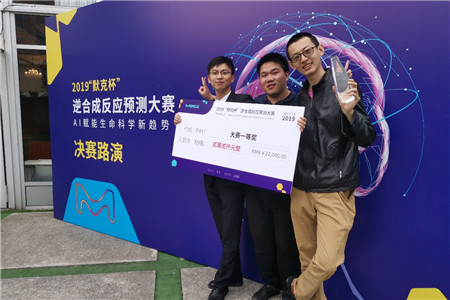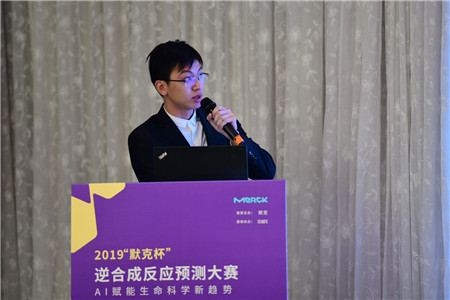Peking University, April 23, 2019: On April 19, 2019, the MDL team from the Molecular Design Laboratory, Peking University (PKU) championed the finals of the Merck Cup Inverse Synthetic Reaction Prediction Competition. The competition, including the preliminary, semi-finals and finals, gathered 371 teams from universities, relevant research institutes of the Chinese Academy of Sciences as well as companies and professionals who engaged in artificial intelligence research and development.

The MDL team
Traditionally, designing reaction route is time-consuming and laborious: before yielding the target product, chemists are required to analyze the molecular formulas of the target products, then use tools such as Scifinder to identify similar structures and synthetic pathways, confirm the required reagents and reaction conditions, and formulate dozens of chemical reactions through past experiences. However, an inverse synthetic analysis program well-devised is time- and energy-efficient, and at the same time less demanding of background knowledge. Merck’s Synthia is now the most prominent reverse synthesis program, with over 70,000 chemical reaction rule databases compiled through years of accumulative research. In recent years, AI comes into play in chemistry and pharmaceuticals to help predict chemical reaction products and reverse synthesis route analysis, which could hopefully be a major break-through of reverse synthesis analysis technology.
The competition is sponsored by Merck KGaA’s Life Sciences business and co-sponsored by Whale Science. The data used falls into training set and test set of 609,946 and 238,282 responses respectively.
The MDL team members were Xu Youjun, Ph.D. candidate from Center for Quantitative Biology, Academy for Advanced Interdisciplinary Studies (AAIS), Lin Kangjie, Ph.D. candidate from College of Chemistry and Molecular Engineering (CCME), and Yin Shiqiu from Beijing Wangshi Intelligence Technology Co., Ltd. They developed DeepRetroReact, a prediction model for inverse synthesis reaction. A large number of chemical reaction data were used to predict reactants. Possible candidate reactants were predicted, scored and selected. The MDL team used the latest natural language processing technology Transformer as the core framework to predict reaction type labels based on products and reactants, assessing the atomic characteristics of the reactions to render the prediction results more reasonable and effective.

Lin Kangjie
The winning team was coached by Professor Lai Luhua from CCME, and Pei Jianfeng, research fellow from Center for Quantitative Biology, AAIS. The Molecular Design Laboratory of PKU is led by Professor Lai Luhua, with a body of teachers, postgraduates and postdoctoral students from CCME and Center for Quantitative Biology, AAIS. The laboratory focuses on drug design and protein design, and has seen progress since welcoming AI into the research.
Written by: Kelly Kan
Edited by: Ma Yaoli

